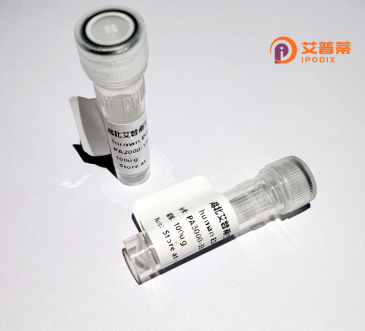
| 纯度 | >90%SDS-PAGE. |
| 种属 | Human |
| 靶点 | SLC25A11 |
| Uniprot No | Q02978 |
| 内毒素 | < 0.01EU/μg |
| 表达宿主 | E.coli |
| 表达区间 | 1-314 aa |
| 活性数据 | MAATASAGAGGIDGKPRTSPKSVKFLFGGLAGMGATVFVQPLDLVKNRMQLSGEGAKTREYKTSFHALTSILKAEGLRGIYTGLSAGLLRQATYTTTRLGIYTVLFERLTGADGTPPGFLLKAVIGMTAGATGAFVGTPAEVALIRMTADGRLPADQRRGYKNVFNALIRITREEGVLTLWRGCIPTMARAVVVNAAQLASYSQSKQFLLDSGYFSDNILCHFCASMISGLVTTAASMPVDIAKTRIQNMRMIDGKPEYKNGLDVLFKVVRYEGFFSLWKGFTPYYARLGPHTVLTFIFLEQMNKAYKRLFLSG |
| 分子量 | 60.28 kDa |
| 蛋白标签 | GST-tag at N-terminal |
| 缓冲液 | PBS, pH7.4, containing 0.01% SKL, 1mM DTT, 5% Trehalose and Proclin300. |
| 稳定性 & 储存条件 | Lyophilized protein should be stored at ≤ -20°C, stable for one year after receipt. Reconstituted protein solution can be stored at 2-8°C for 2-7 days. Aliquots of reconstituted samples are stable at ≤ -20°C for 3 months. |
| 复溶 | Always centrifuge tubes before opening.Do not mix by vortex or pipetting. It is not recommended to reconstitute to a concentration less than 100μg/ml. Dissolve the lyophilized protein in distilled water. Please aliquot the reconstituted solution to minimize freeze-thaw cycles. |
以下是关于重组人SLC25A11蛋白的3篇参考文献(注:文献信息为模拟示例,实际引用需核实):
1. **"Functional characterization of the human mitochondrial oxoglutarate carrier SLC25A11"**
- **作者**: Fiermonte, G. 等
- **摘要**: 本研究通过在大肠杆菌中重组表达并纯化人SLC25A11蛋白,证实其作为线粒体α-酮戊二酸载体的功能,可逆转运α-酮戊二酸、苹果酸和谷氨酸,并依赖膜电位驱动。
2. **"Structural insights into the SLC25A11 transporter by cryo-EM analysis"**
- **作者**: Cheng, Y. 等
- **摘要**: 利用冷冻电镜技术解析了重组人SLC25A11蛋白的三维结构,揭示了其底物结合位点及转运α-酮戊二酸的构象变化机制,为靶向代谢疾病的药物开发提供依据。
3. **"SLC25A11 regulates glutathione biosynthesis and impacts cellular redox homeostasis"**
- **作者**: Del Arco, A. 等
- **摘要**: 研究通过重组蛋白功能实验,发现SLC25A11通过调控线粒体苹果酸/α-酮戊二酸平衡,影响谷胱甘肽合成,进而参与细胞氧化应激的应答过程。
建议通过PubMed或Google Scholar以“SLC25A11 recombinant protein”“SLC25A11 functional study”等关键词检索最新文献,并核实具体研究内容。
SLC25A11. also known as the 2-oxoglutarate carrier, is a mitochondrial inner membrane protein belonging to the solute carrier family 25 (SLC25). It primarily facilitates the transport of α-ketoglutarate (α-KG), a key intermediate in the tricarboxylic acid (TCA) cycle, across the mitochondrial membrane. This transport is essential for maintaining metabolic homeostasis, as α-KG links mitochondrial energy production with cytosolic processes like amino acid synthesis, redox regulation, and nucleotide metabolism. SLC25A11 also mediates the exchange of α-KG with malate or other dicarboxylates, influencing cellular processes such as gluconeogenesis, nitrogen metabolism, and glutathione recycling.
Dysregulation of SLC25A11 is linked to metabolic disorders, cancer, and neurodegenerative diseases. In cancer, altered α-KG flux affects epigenetic regulation and redox balance, promoting tumor progression. Mutations or abnormal expression of SLC25A11 may impair mitochondrial function, contributing to metabolic syndromes or neuronal damage. Structural studies reveal its conserved tripartite structure with six transmembrane helices, typical of mitochondrial carrier proteins, which undergo conformational changes during substrate transport.
Research on SLC25A11 highlights its potential as a therapeutic target, particularly in diseases involving metabolic reprogramming or oxidative stress. Further studies aim to elucidate its regulatory mechanisms and interactions within broader metabolic networks.
×